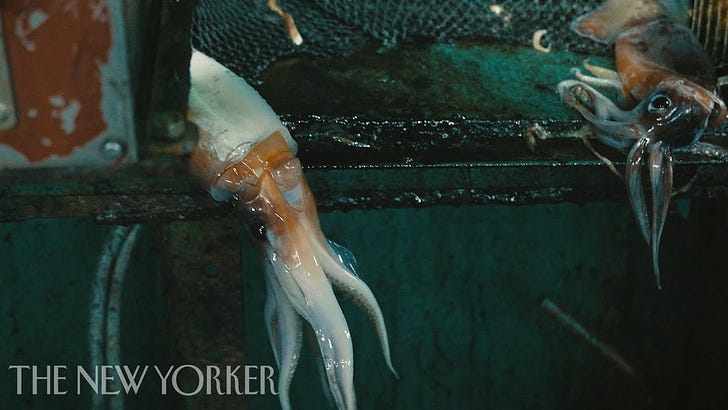One of the most rewarding parts of this investigation was the opportunity to work again with Ed Ou and Will Miller. They are two documentary filmmakers who made an Emmy Award winning film with us about Libya in 2021. I asked Ou and Miller to join me at sea, boarding Chinese squid ships. I had already been visiting these ships as part of the investigation my team was doing into the use of forced labor by the global seafood industry.
China has the world’s largest distant-water fishing fleet, catching billions of pounds of seafood annually, the biggest portion of it squid. The fleet is rife with labor trafficking, abusive working conditions, and violence. But China publicly releases little information about its vessels, and most stay at sea for more than a year, making them difficult to track or inspect.
To see the fleet up close, Ou and I travelled to fishing grounds near the Falkland Islands and the Galápagos. We chased boats, interviewed crews by radio, and, when permitted, boarded ships. My goal was to talk to crew members and chronicle their working conditions. “Squid Fleet,” the film that Ou produced, offers something deeper. Ou and his co-director, Will Miller, made a hybrid documentary, combining fictionalized narration with real footage from the trip to capture a strange world that few outsiders get to see.
Squid fields feel industrial, because so many large ships, sometimes hundreds of them, concentrate their work within a fifty-mile radius. At night, when most squid fishing happens, the blackness stretches in all directions, like outer space. The ships use extremely bright bulbs, which can be seen from miles away, to attract squid to the surface. Spending time in such a place is disorienting, like standing on a radar map with blips of light on all sides. It can become difficult to situate yourself—to discern whether you are in the center of the fishing grounds or on their outer edge. Onboard, virtually every surface is coated in oozy ink. Generators roar and jigs clang. The film conjures this sensory overload.
Tonally, “Squid Fleet” was meant as a counterbalance to the investigative reporting, which provides a critical assessment of the human-rights and environmental record of this fleet. The filmmakers sought to offer a more intimate look at the experience of working in such a grueling job. Ou said he hoped to illustrate “a universal feeling of sacrifice, longing, and abandonment.” The film also aimed to communicate why someone might choose to take one of these dangerous, often exploitative jobs. “Our goal was not only to convey information but also to capture the complex motivations of the fishermen,” Miller said.
The film can be watched below:
The narrator in the film is a fictional young man from China, who recalls the stories that his father, a squid fisherman, has told him about life at sea. The stories are derived partly from court records, labor contracts, and dozens of conversations Ou and I had with crew members. But the account is imagined—an amalgamation intended to capture, in a more poetic fashion than reporting typically does, an array of common experiences. The film’s writer, Michael Hsu, scripted the narration from the perspective of someone still living in China, partly to make it clear that the voice did not represent any specific person who appears in the footage from the ships.
In the film, the narrator recounts some of the fantastical seafaring tales that he heard growing up, including about aliens visiting the village from the above. Beams of light from the alien ships pull people into the sky “like beads on a string.” Michael Hsu, who wrote the script, told me that this element was partly intended as a gesture toward the otherworldliness of squid fishing. He also wondered what it would be like to be a squid and “to be visited by the alien ships, abducted, consumed.” He saw a connection between the experience of the catch and that of the workers, who are also whisked away from their homes on these strange ships and “alienated from their labor by this vast, seemingly inhuman machine.”
The filmmakers used specialized infrared drones to capture the heat signatures of workers on ships, and to give the footage a sense of strangeness. Some of it was shot underwater, using a remote-controlled submarine. The scuba diver and marine conservationist Pete Bethune, who accompanied me on one of my reporting trips, also captured underwater footage of squid being snagged by hooks and dragged to the surface.
The young man in the film recalls, too, his father telling him about the brutal hours at sea, the harsh storms, and the way “your mind wanders as your hands work.” Eventually, though, the son, employed at a machine-parts factory, discloses that he is considering following in his father’s footsteps and head to sea, in part drawn by a sense of national pride, adventure, and duty.
Near the end, the film turns its lens back toward Western consumers. “This is not something people are doing somewhere over there, separate from our own lives,” the narrator says. “It’s here on the dinner table.” Some of the Chinese fleet’s catch ends up in grocery stores and restaurants in the U.S. and E.U. “What choice do I have?” he asks. “I have to eat. My family has to eat. And you, who have always eaten well—I am sure you will eat, too.”


